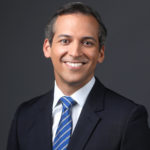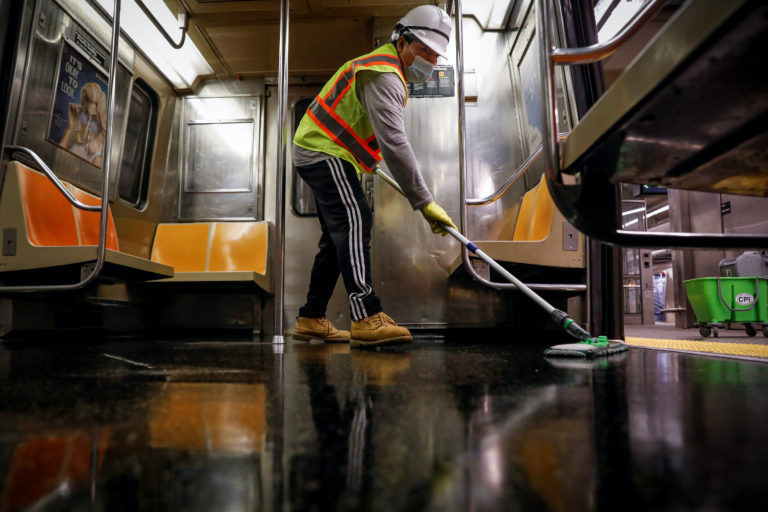On Tuesday, President Trump traveled to Arizona to visit a Honeywell factory where the crucial N95 face masks are manufactured. The administration is pushing to move production of medical equipment to the U.S., after the coronavirus pandemic sparked a global battle for critical resources -- many of which are made in China. Nick Schifrin reports on challenges of both production and politics.
Read the Full Transcript
Notice: Transcripts are machine and human generated and lightly edited for accuracy. They may contain errors.
-
Judy Woodruff:
As we have been reporting, President Trump flew to Arizona today to visit a new Honeywell factory that makes medical masks.
It is part of a massive push by the Trump administration to move more production of medical equipment to the U.S.
And, as Nick Schifrin reports, it comes amid a global battle for medical equipment, after a worldwide shortage.
-
Woman:
We demand that you immediately get PPE to nurses, doctors and health care workers.
-
Man:
We are wearing, I kid you not, white aprons.
-
Woman (through translator):
Our colleagues don't have PPE, and they're being infected.
-
Woman:
We have people coming and sewing things for us, sewing masks, making things out of plastics. I mean, that would be like a soldier going to war and making a plastic gun to bring with him.
-
Nick Schifrin:
In this war, the front line has often fought without protection. Doctors and nurses had to create their own personal protective equipment, or PPE. The shortage killed hundreds of them.
In the U.S., Health and Human Services found widespread shortages that put staff and patients at risk. Countries and U.S. states competed for PPE in a worldwide cutthroat competition.
-
Governor Gavin Newsom:
We have been competing against other states, other nations, our own federal government, for PPE, coveralls, masks, shields.
-
Tom Inglesby:
There is no system of allocation or distribution that takes into account the needs of various parts of the world. It becomes kind of a marketplace to the highest bidder.
-
Nick Schifrin:
Dr. Tom Inglesby directs Johns Hopkins' Center for Health Security. He says the pandemic has exposed a key U.S. vulnerability.
-
Tom Inglesby:
There are many companies that are based overseas that make product that comes to the U.S., so we are dependent on overseas PPE, manufacturing and shipping.
-
Nick Schifrin:
The global center for PPE is China. Before COVID-19, Chinese, U.S., and other companies based in China produced approximately 50 percent of the world's supply.
China is now increasing its production. But, in January, as Chinese doctors struggled to confront the country's COVID-19 peak, they didn't have enough PPE. So Chinese companies dispatched employees around the world to buy supplies, including in Australia, as seen in this Australian "60 Minutes" story.
-
Man:
If you have time, please drop by your local pharmacy to check if there are any 3M N95 or 8210 masks for sale.
-
Woman:
Staff bought up what they could from pharmacies in Eastwood to Penrith, Hornsby to Mona Vale.
-
Nick Schifrin:
At the same time, the Trump administration was facilitating American PPE for China, 17.8 tons of it. Secretary of State Mike Pompeo tweeted this video in early February.
But China wasn't only accepting American PPE. In January and February, it blocked U.S. factories in China from exporting masks and other materials back to the U.S.
China effectively nationalizes some of these companies, including American companies' product inside of China. What was the impact of that?
-
Derek Scissors:
When you say nationalizes, in a crisis, any country would do that. That was unavoidable. We didn't need the products then.
-
Nick Schifrin:
Derek Scissors focuses on China for the American Enterprise Institute. He says the bigger problem is getting PPE out of China today.
Chinese television has promotes the export of billions of medical supplies around the world. Senior U.S. officials say those exports slowed after countries complained about quality, and China introduced more quality control.
But there is another reason why China is slow-rolling exports to the U.S., says Scissors.
-
Derek Scissors:
I don't think the Chinese are hurrying to supply the United States. They have countries they think they can win diplomatic points with, a lot of them ahead of us. And so, in addition to the problem of low-quality production, in addition to the problem of bureaucracy, there's definitely an element of, we're not rushing to fix those problems for the U.S.
-
Nick Schifrin:
The Chinese government says it's doing all it can to increase production and distribute supplies around the world.
-
Li Xingqian (through translator):
China is transporting protective supplies to countries and regions that are in urgent need at the fastest speed every day.
-
Nick Schifrin:
But senior U.S. officials accuse China of using those exports for coercion. A recent article in Global Times, a Chinese newspaper that reflects government thinking, said China should consider halting medical exports to the Netherlands because of improved ties with Taiwan.
-
Tom Inglesby:
When you see other countries stop exporting critical materials like PPE , for whatever reason, it shows that the U.S. shouldn't be reliant on overseas production and shipping of critical material like masks and gowns and gloves.
-
Nick Schifrin:
American companies like 3M and Honeywell beefed up production in the U.S. in January.
The Trump administration has encouraged that. And, today, President Trump visited Honeywell's new plant in Arizona.
-
President Donald Trump:
So we're doing something very dramatic. And there's never been — there hasn't been anything like what we have done since — there's a mobilization — since World War II.
-
Nick Schifrin:
But manufacturers want to maintain their China supply chain, says Scott Whitaker, CEO of a medical manufacturers trade association.
-
Scott Whitaker:
But I think there is likely going to be a shift to some degree as well to more U.S. manufacturing. But I think the reality is, you still have to recognize the global supply chain exists today. And so you want to make sure that you're doing both.
-
Nick Schifrin:
FEMA says, since late March, the U.S. has imported from China more than 163 million masks, gloves, gowns, thermometers, and shields.
Nearly a billion of equipment, mostly gloves, have been imported from all over the world. Senior Trump administration officials describe the air bridge of supplies to the U.S. as a massive success.
But Obama administration officials say it shouldn't have been necessary.
-
Christopher Kirchhoff:
We realized the systems would collapse.
-
Nick Schifrin:
In 2015 and 2016, Christopher Kirchhoff served on the White House Ebola Task Force and led the Obama administration's lessons learned study that predicted today's PPE shortage and a way to prevent it.
-
Christopher Kirchhoff:
We didn't make a major investment in PPE that we knew we needed. Had our testing and surveillance systems worked as they should have in the first place, we never would have ended up in a situation where we're this short of PPE.
-
Nick Schifrin:
Today's increased manufacturing in the U.S. should lead to less U.S. dependence on foreign imports.
But, even today, front-line workers are paying the price for the shortage.
For the "PBS NewsHour," I'm Nick Schifrin.








What do you think? Leave a respectful comment.